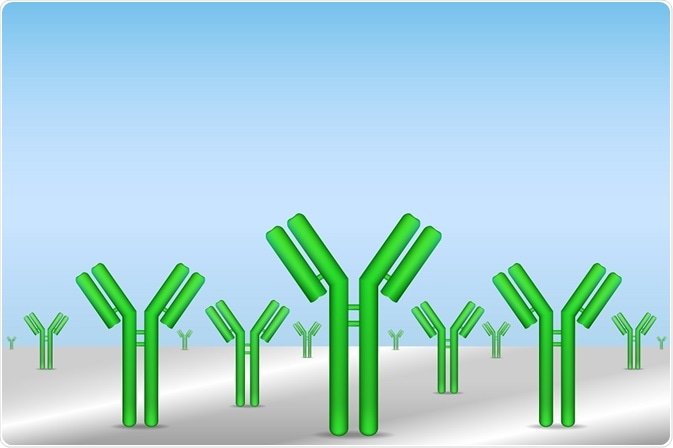The Enzyme-linked Immunosorbent Assay (ELISA) is a biomolecular technique that utilizes the specificity of an antibody, as well as the sensitivity of enzyme assays, to detect and quantify molecules such as hormones, peptides, antibodies, and proteins.

extender_01 | Shutterstock
There are three common variations of ELISAs: double antibody sandwich ELISA, indirect ELISA, and competitive ELISA, giving rise to a wide variety of applications – including clinical, forensic and food research.
From cancer screening to drug and pregnancy testing
Identification of cancer biomarkers for the early detection of cancer is a challenge that is continuously being developed and researched. ELISA based techniques are available and used clinically for testing for the early stages of cancers – including ovarian and breast cancer.
Furthermore, concentrations of illicit drugs, such as cannabinoids, amphetamines, opiates, cocaine, benzodiazepines, and methadone, can be determined using ELISA in urine samples. The method can be also used to monitor the levels of pharmaceutical drug concentrations in patients undergoing treatment, for example, antidrug antibodies in rheumatoid arthritis and inflammatory bowel disease patients.
ELISA is also frequently used to test for the detection of hormone human chorionic gonadotrophin (hCG) in urine, which is higher in women that are pregnant, thus allowing for easy access and home testing capabilities.
Enzyme-Linked Immunosorbent Assay (ELISA) - Multi-Lingual Captions
Detection of platelet antibodies
Detection of platelet antibodies in serum is used to identify patients suffering from disorders such as idiopathic thrombocytopenic purpura and systemic lupus erythematosus. These tests use the enzyme alkaline phosphatase, which is labeled with anti-human lgG.
In addition to offering a less expensive and complex method for detection of platelet antibodies, ELISA has also been found to offer more than other commonly used tests such as the lymphocytotoxicity (LCT) and platelet immunofluorescence test (PIIFT).
Food allergens
ELISA is popularly used in the food industry to detect the presence of allergens for legally required ingredient labeling. This application benefits greatly from the sensitivity of ELISA and can detect levels of potential food allergen contaminants at concentrations on the low parts per million (ppm) scale. It also has the advantage of being able to test for oils and other substances like egg whites or milk, which alternative methods such as PCR are unable to detect.
Detecting viruses using viruses
The advantages of using ELISA for detection of viruses is that they can be used in developing countries where infection rates are often very high, and can reach the most vulnerable groups with the on-site testing capabilities and instant results, allowing for opportunistic testing (e.g. at the emergency department).
HIV
ELISA was the first universal testing kit for HIV and employs the detection of human serum cystatin C to identify patients who are positive.
West Nile Virus
The detection of West Nile Virus is carried out by IgM antibody-capture (MAC) ELISA of patients’ serum or cerebrospinal fluid (CSF), which has been taken 8 to 21 days following the appearance of symptoms. This test can also confirm whether or not the infection has progressed to the patient’s central nervous system.
Newcastle Disease Virus (NDV)
NVD is an avian virus that can be passed to humans and depending on the strain present, NDV disease can vary in severity from moderate respiratory dysfunction to diarrhea and other life-threatening symptoms. From the most lethal strains of NDV (velogenic NDV) to increasingly less severe strains (mesogenic NDV and lentogenic NDV), ELISA is used to monitor their presence within a population, aiding the coordination of vaccination programs, as well as identifying any NDV infected flocks.
Further Reading
Last Updated: Jan 18, 2023